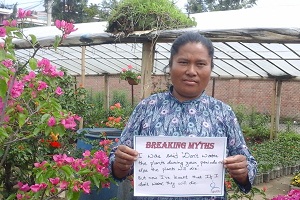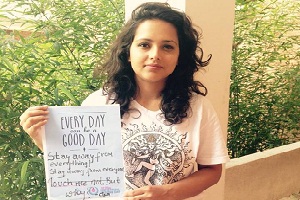
Breaking Menstrual Taboos
Despite the heavy urbanization in Kathmandu, the behavior of people is still conservative. It is no surprise when we say there still are many taboos and superstitions related to menstruation in Kathmandu. The taboos may differ from religion to religion and even family to family.But even today, no matter how modern the girls in Kathmandu may appear to be, they have to face some or the other restrictions during their periods.
Archana Niraula,a student of B.Sc. Environmental Science at Kathmandu University, is a modern Kathmandu resident. She is intelligent, smart and has broad thinking.But she has a difficult time asking for her rights during menstruation.She isn’t touched by anyone during her period days, not even her mother. She is isolated from everyone, given a separate room and fed separately. She is not allowed to touch the common water tap, water the plants, enter any other rooms, and the list goes on and on. “Yes, I feel bad when being treated so. But I have no option other than following them.” she shares.
Not only Archana, many other girls have to face the discrimination during their periods. There are Do’s and Don’ts for menstruating girls in most families.“Don’t touch the foods”, “Don’t enter the kitchen”, “Don’t touch the plants, “Don’t touch the water source”, “Don’t touch your dad” are some of the common dialogues girls have to hear every month. When the society has developed so much in terms of education and infrastructures, why are we still sticking on with these stigmas? Doesn’t blindly following these tradition to avoid committing any sin add on more sin done on women?
“The religion I follow strictly believes in purity. Maybe this is the reason why these traditions have started.” defended Archana. These traditions started when there were no sanitary pads and staining was a main problem. The traditions started when the toilets were far from the house and there was no knowledge about menstrual hygiene. But now, that the situation has changed, the practices must be eliminated as well.The traditions started with an intention to maintain cleanliness. Now that we have better means to maintain hygiene, the old ones must be eliminated.
On being asked, if she would continue the traditions in her future, Archana replied “Well, it is impossible to change my parents and it would rather hurt them if I did so. But I will certainly cut off all the unnecessary practices in my future generation.”
In Kathmandu, voices for more respect to women have been raised and are addressed too.Respect and equality for women at home, education, and work have been demanded and they are being fulfilled. But, when it comes to menstruation, respect seems to be lost in silence. Maybe because, women themselves want to be discriminated due to the fear of the Almighty God.
Well, it was at the time of Dashain last year,that I had my periods,just before The Big Day. I was forced to visit the relatives but then restricted from taking the “Tika”. I felt bad, discriminated, untouchable, and faulted for having periods. I enjoyed with everyone fine, but when the “Tika” ceremony was about to start, I had to disappear. At one of my relatives, though, my Aunt, in her 40’s, came up to me and scolded me. She said, “You being a modern educated girl, can’t you ask for your rights? You have to go many big places in future. Will you confine yourself this way? You will doom you future, my child. Please don’t do this.” My mother was sitting right beside me, and she could say nothing. My aunt took me to the take the “Tika” and blessings. I had tears in my eyes because it was a big step for me. It was a big step for my mother too, because she agreed to the change. I was taking a step that my culture told was wrong, but I felt happy defying it. I felt the change coming.

Shilpa Koirala, student
Now-a-days there are anti-rape slogans like “Don’t tell your daughters how to dress, teach your son how to respect.” So, why not teach men regarding menstruation as well? Even today in some families, boys are taught not to touch their sisters or mother during her periods.If this is the education we give to young boys, we can never make them fully respect females in the future.Male members of the family should also be explained what a girl has to go through during her periods.Only then can women gain care and respect she needs during her days.
Thus, living in the capital city and earning a 5-digit salary is of no use if we are still conservative and old-fashioned in our thoughts. Women in Kathmandu already have to fight a lot for her rights at education and work. So, discrimination during her periods should be the last thing that troubles her. Working women of today have to deal with a lot of pressure,both at work and home. So, it would be a great relief for her, if her husband volunteered to cook. Restriction from entry to the kitchen must be eliminated but understanding that she is having a tough time must be incorporated.
By Manashree Newa, GUTHI

